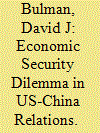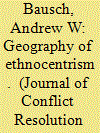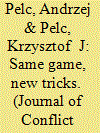|
|
|
Sort Order |
|
|
|
Items / Page
|
|
|
|
|
|
|
| Srl | Item |
| 1 |
ID:
177645


|
|
|
|
|
| Summary/Abstract |
China and the United States are caught in an economic security dilemma. In response to perceived economic aggression,
both countries now feel impelled to bolster domestic economic security through protectionist and retaliatory measures that the other side perceives as threatening. In game
theoretic terms, a mutually beneficial “Stag Hunt” coordination game devolved into an uncooperative “Prisoner’s Dilemma” after the global financial crisis. In the economic security dilemma that emerged under Trump and Xi, both sides
unsuccessfully attempted to coerce opponent behavior, further harming both economies. Using a game framework—as
opposed to a structural or leadership-based account—helps
demonstrate that China’s recent reform reversal and revisionist approaches to the international economic order were
not unavoidable parts of a long-term strategy, but rather developed partially as a response to perceived US aggressions.
|
|
|
|
|
|
|
|
|
|
|
|
|
|
|
|
| 2 |
ID:
138078


|
|
|
|
|
| Summary/Abstract |
Hammond and Axelrod use an evolutionary agent-based model to explore the development of ethnocentrism. They argue that local interactions permit groups, relying on in-group favoritism, to overcome the Nash equilibrium of the prisoner’s dilemma and sustain in-group cooperation. This article shows that higher levels of cooperation evolve when groups are dropped from the model, breaking the link between ethnocentrism and cooperation. This article then generalizes Hammond and Axelrod’s model by parameterizing the underlying geographical assumptions they make about the evolutionary environment. This more general model shows that their findings are sensitive to these assumptions and that small changes to the assumed geography of reproduction significantly affect the probabilities of finding ‘‘ethnocentric’’ behaviors. The model presented here indicates that it is not local interactions, per se, but settings where interactions are highly likely to be with close relatives that lead to ‘‘ethnocentrism’’ as modeled by Hammond and Axelrod.
|
|
|
|
|
|
|
|
|
|
|
|
|
|
|
|
| 3 |
ID:
091616


|
|
|
|
|
| Publication |
2009.
|
| Summary/Abstract |
The aim of this article is to distinguish between strategies in the Iterated Prisoner's Dilemma on the basis of their relative performance in a given population set. We first define a natural order on such strategies that disregards isolated disturbances, by using the limit of time-average payoffs. This order allows us to consider one strategy as strictly better than another in some population of strategies. We then determine a strategy-to be ''robust,'' if in any population consisting of copies of two types of strategies, itself and some other strategy - the strategy - is never worse than. We present a large class of such robust strategies. Strikingly, robustness can accommodate an arbitrary level of generosity, conditional on the strength of subsequent retaliation; and it does not require symmetric retaliation. Taken together, these findings allow us to design strategies that significantly lessen the problem of noise, without forsaking performance. Finally, we show that no strategy exhibits robustness in all population sets of three or more strategy types.
|
|
|
|
|
|
|
|
|
|
|
|
|
|
|
|
| 4 |
ID:
140083


|
|
|
|
|
| Summary/Abstract |
Many international interactions are structured like a prisoner’s dilemma because there are incentives to cooperate but also incentives to defect. In an infinitely repeated prisoner dilemma interaction, valuing the future highly enough by discounting the future less can ensure cooperation. Another factor that affects international cooperation in an infinitely repeated prisoner’s dilemma interaction is how quickly actors can respond to defection with retaliation, in other words, the speed of retaliation. Speeding up retaliation to ensure cooperation is an attractive strategy because it is flexible. It can be adapted to the particular characteristics of a dyad of cooperation and can vary with different actors and even different forms of cooperation between the same two actors. An analysis of an infinitely repeated prisoner’s dilemma interaction shows that if speeding up retaliation is costless, payoffs are constant in time, and the temptation payoff is reduced in proportion to the speed-up of retaliation, then no matter how unfavorable the starting discount factor and unfavorable the payoffs, speeding up retaliation can make cooperation sustainable. This, in combination with its inherent flexibility, makes speeding up retaliation a potentially powerful tool to make cooperation sustainable. Because speeding up retaliation likely has some implementation costs and because prisoner dilemma payoffs may not be constant/even in time, there are limits on when speeding up retaliation is effective. However, the analysis shows that if implementation costs are not too high, payoffs are not too uneven, or, if uneven in a particularly unfavorable way, punishment, when inflicted, is sufficiently punishing, then speeding up retaliation can still be effective in ensuring sustained cooperation.
|
|
|
|
|
|
|
|
|
|
|
|
|
|
|
|
|
|
|
|
|